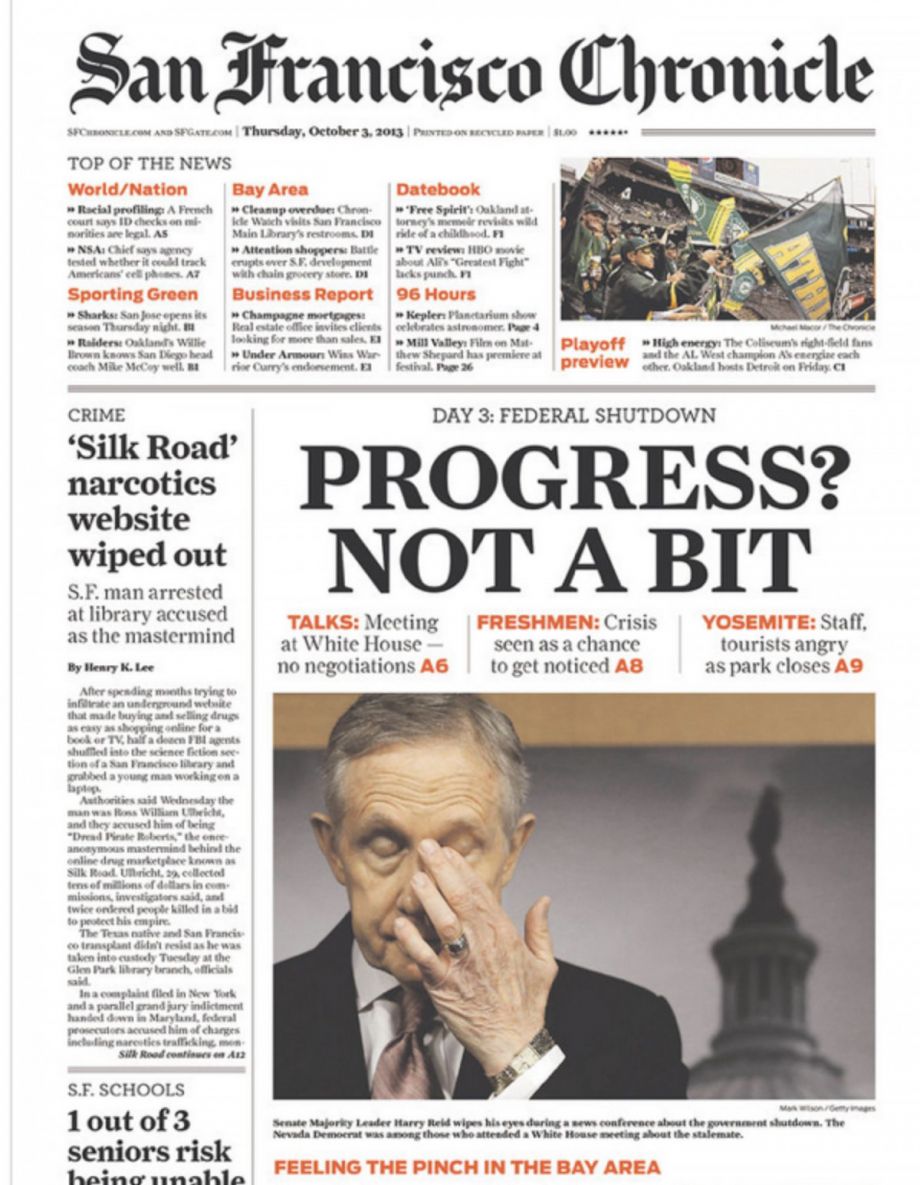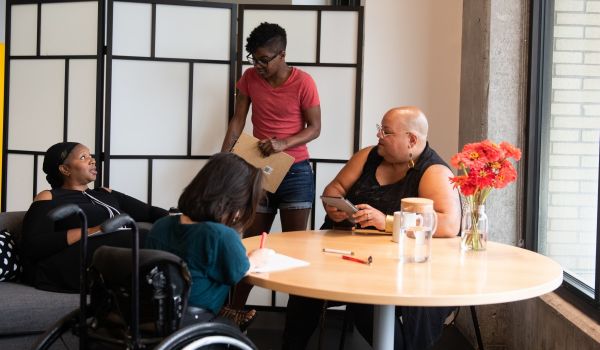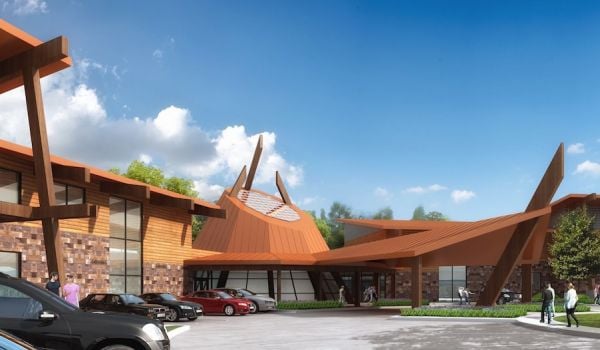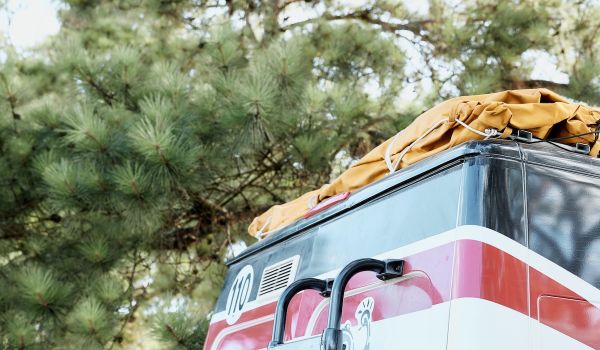The Newseum performs a national service by, each day of the year, rounding up a selection of newspaper front pages from around the U.S.. It’s a great way to take the country’s temperature. But during times like this, when the public is fixated on one news story in particular — that is, the federal government shutdown — it can be healthy reminder that the conventional wisdom incessantly repeated on cable news or echoed on Twitter by national reporters doesn’t necessarily mirror what’s happening in, as Al Roker would say, your neck of the woods.
To wit, polls showing that nearly three-fourths of the country thinks that shutting down the federal government to slow the adoption of the Affordable Care Act is a bad idea have gotten much attention. The consensus is that that’s terrible for the Republican Party. And it may turn out to be. But a look at front pages from around the U.S. suggests that while the shutdown’s local effects are being felt, local media, at least, isn’t drawing for the public a straight line from Republican tactics > the shutdown > the impact on their area > back to Republican tactics.
Let’s take a look.
The San Francisco Chronicle (above) leads with a picture of Senate Majority Leader Harry Reid, looking either weepy or exhausted. Stories detail the considerable effect on local parks and tourist attractions, including Alcatraz and Muir Woods. There’s a somewhat troubling mention of the fact that the California-based employees of the U.S. Geological Survey, who track earthquakes for the West Coast, are off the job. And there’s a note about the fact that that funds for the San Francisco Housing Authority are expected to drop, which means people might be unable to move into public housing. But other than the photo of Reid, there’s no mention of who might be responsible.
The New Haven Register goes with a giant photo of the closure of the Steward B. McKinney National Wildlife Refuge, and there’s a teaser to a story on how local companies with federal contracts, like the helicopter manufacturer Sikorsky, might have to take workers off payroll. Then, in a small box at the bottom, there’s a squib on the politics of it: “GOP proposes measure to fund portions of government, but Senate not interested in piecemeal deal”:
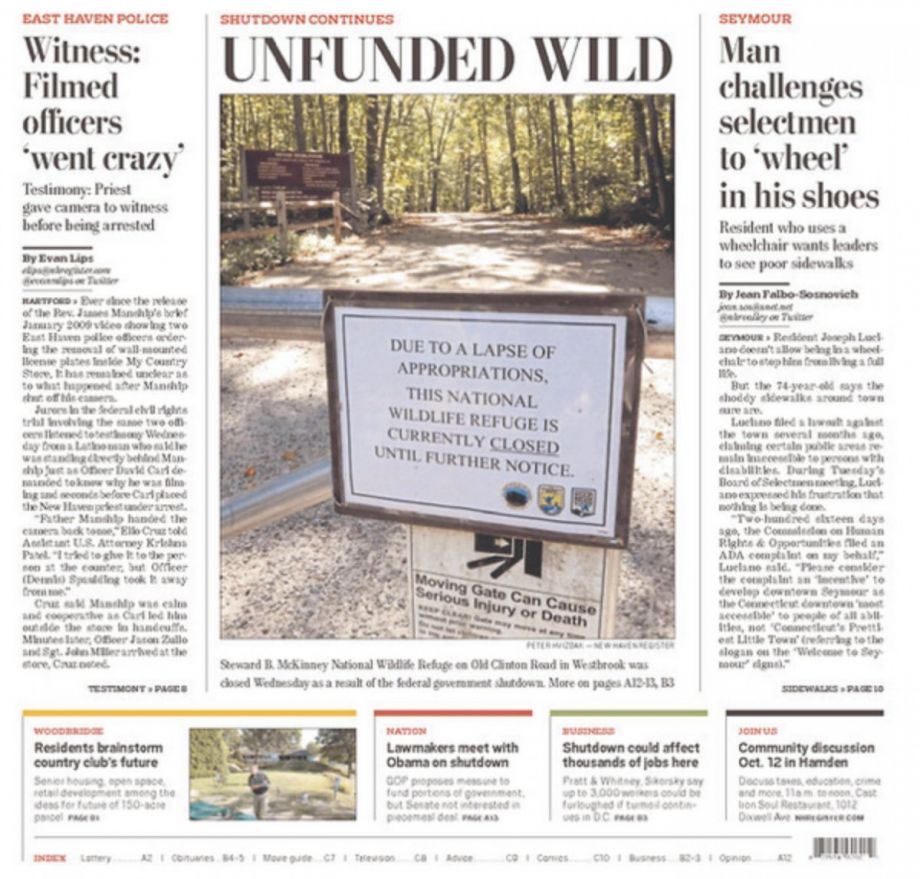
Up in Alaska, the Anchorage Daily News has two stories on the shutdown. On the local implications, there’s “Anxiety Hits Alaska Federal Workers.” And on the wrangling in D.C., there’s a piece with the pox-on-both-their-houses headline, “Shutdown Standoff: A Meeting But Nobody Wins”:
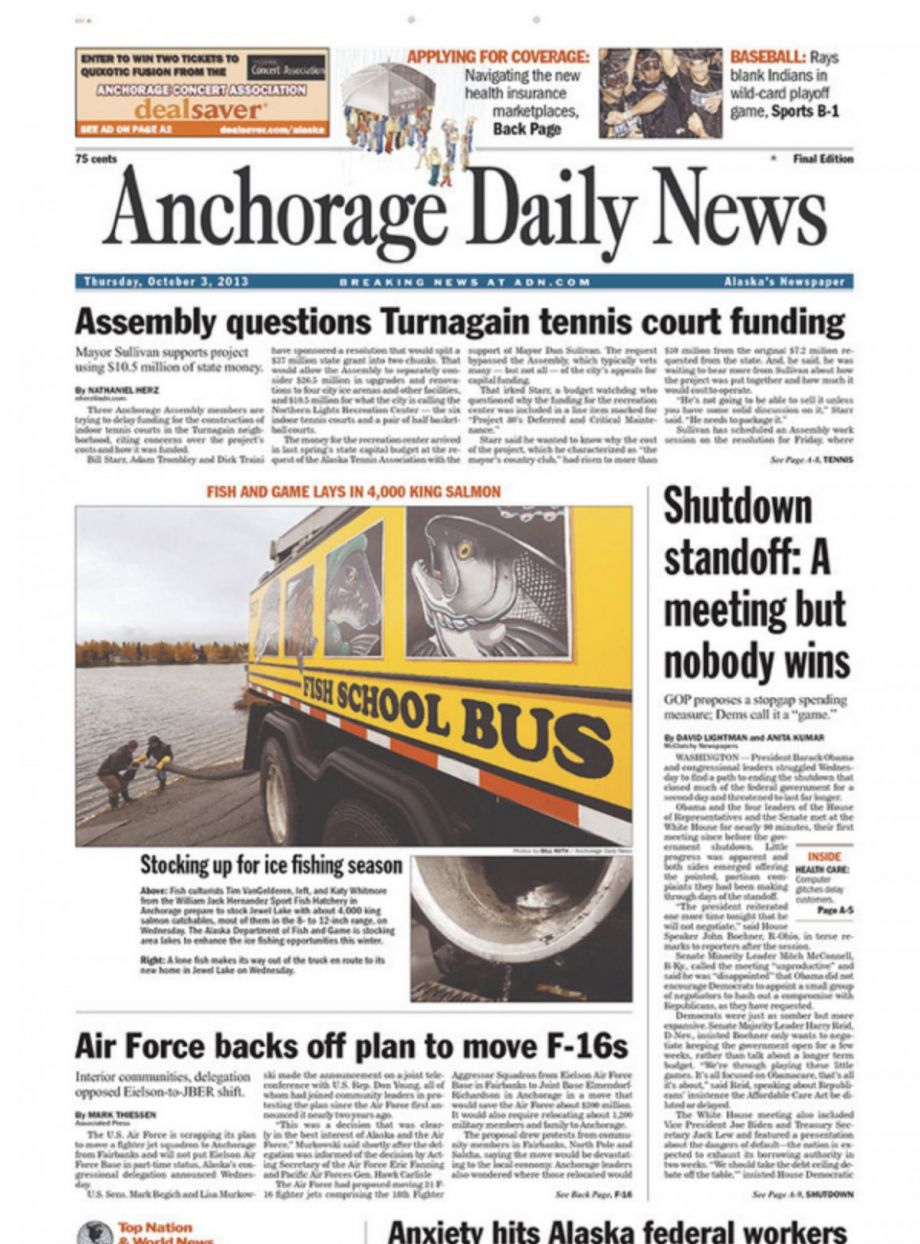
Arizonans, reports the Arizona Daily Sun, are worried about how the shutdown has closed Grand Canyon National Park, with some arguing that the state should step in and fund the park to recapture some of the tourism dollars — and tax revenue — lost each day it is closed. With no safety personnel in place, the paper reports, visitors “were darting in front of ongoing traffic.” Workers at the Naval Observatory have been furloughed and National Park Service employees are out of work. But there’s no mention on the front page of who’s responsible. The closures might as well have resulted from a force of nature:
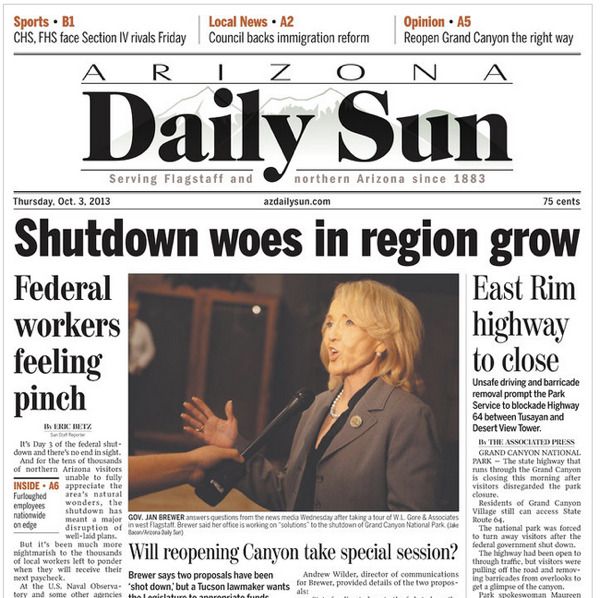
The Arkansas Democrat Gazette reports that the state National Guard has delayed monthly weekend training for some 10,000 people, and that the National Center for Toxicological Research outside Pine Bluff is operating with just 10 percent of its regular staff. Meanwhile, over in Washington, “Leaders Meet, No One Blinks”:
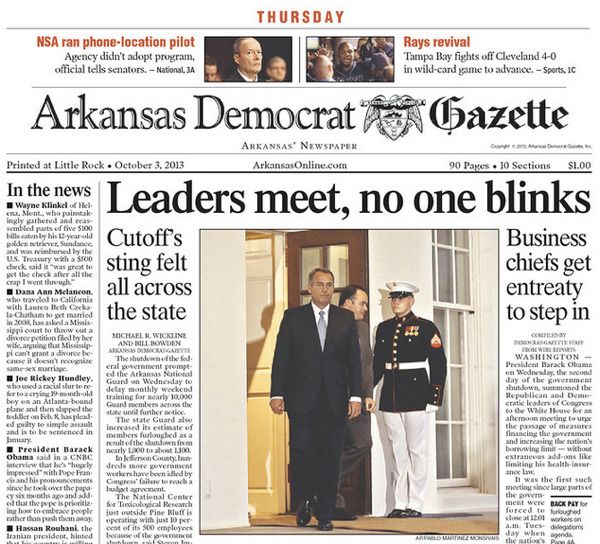
The Los Angeles Times has the headline, “Yosemite Closure a Blow to U.S. Image,” a story that details a pair of honeymooning Irish tourists who talk about childhood visions of visiting the park’s trees. “That was America,” they mourn. Yosemite’s closure, reports the paper, is “an emblem of the bitter, partisan battle in Washington.” All that is accompanied by a news story that focuses on what the president isn’t doing: “Obama Keeps Distance in This Standoff”:
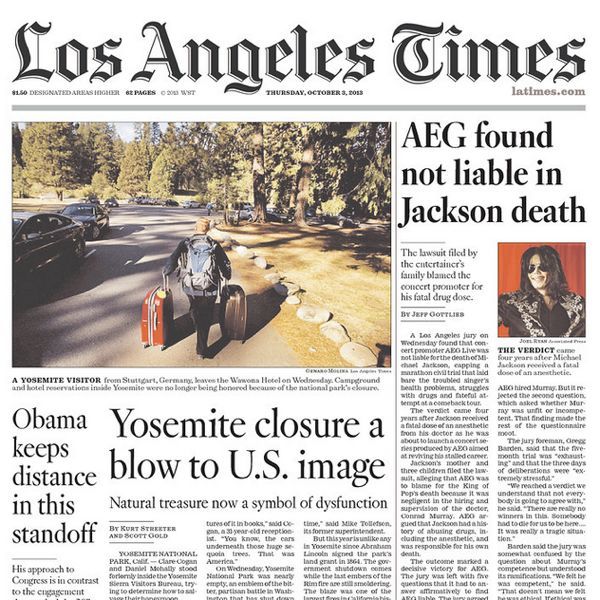
The Cape Cod Times — published out of Hyannis, land of the Kennedys — has a gripping story on a local man who was due to start a clinical trial for his cancerous liver tumor at Dana-Farber Cancer Institute in Boston that has now been put on hold. On the political side, there’s a small boxed teaser with a photo of Obama, seemingly mid-yell, with the headline, “No Dice”:
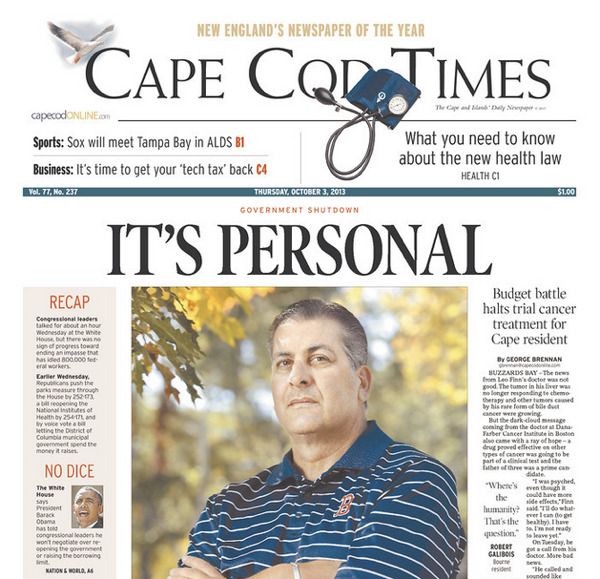
The St. Cloud Times out of Minnesota goes with a photo of a little girl yanking on the seemingly locked door of the Lake Superior Maritime Visitor Center in Duluth. The paper also notes that the Fall Wildlife Festival in Sherburne National Wildlife Refuge has been cancelled because of the shutdown. The political headline? “Both Parties Say They Are Unwilling to Negotiate”:
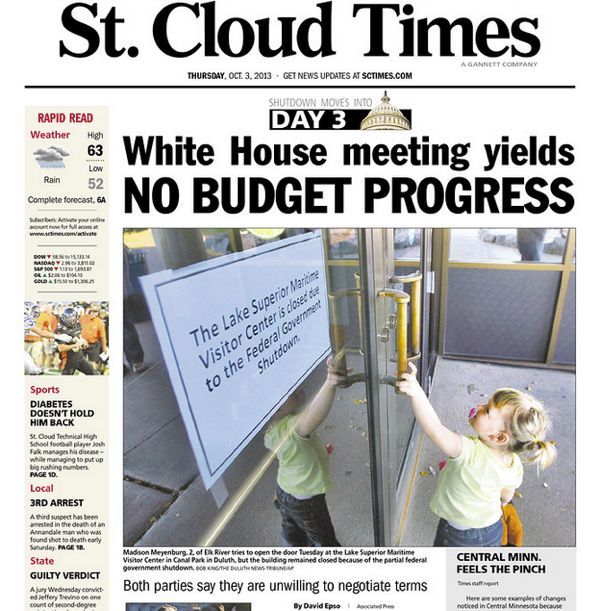
The Lubbock Avalanche-Journal in Texas pairs a photo of House Speaker John Boehner and New York Democrat Steve Israel under the headline, “Not Budging.” Reporting on the on-the-ground repercussions, the paper talks about local farmers who aren’t able to get crop data or commodity loans because of the shutdown:
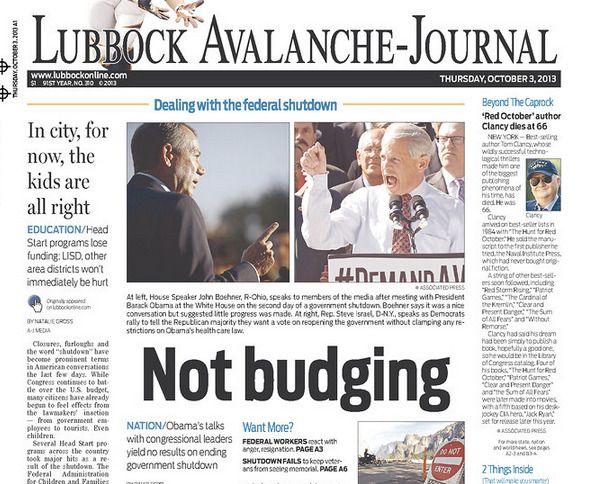
Finally, the Tampa Tribune details the effects of the shutdown on MacDill Air Force Base, where more than 1,500 civilian workers were sent home. On the politics, the slug is “No End to Impasse in Sight”:
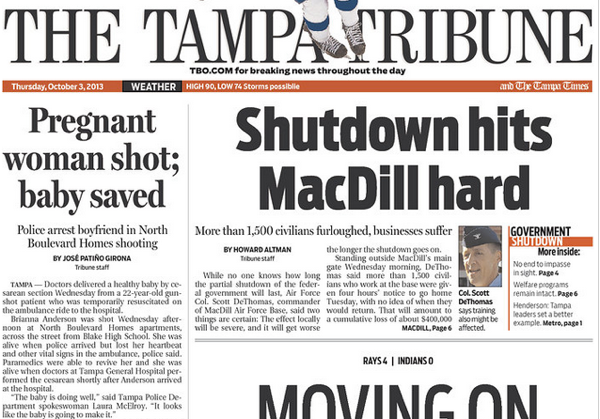
This is, of course, just a sprinkling of papers, but the pattern holds. Take a look. What it suggests is that, yes, the shutdown’s distributed affects are being felt and noted, but that Democrats assuming that the country will necessarily connect those myriad local inconveniences and sacrifices directly to Republicans’ political maneuvering in the halls of Congress might be expecting a bit too much.

Nancy Scola is a Washington, DC-based journalist whose work tends to focus on the intersections of technology, politics, and public policy. Shortly after returning from Havana she started as a tech reporter at POLITICO.

